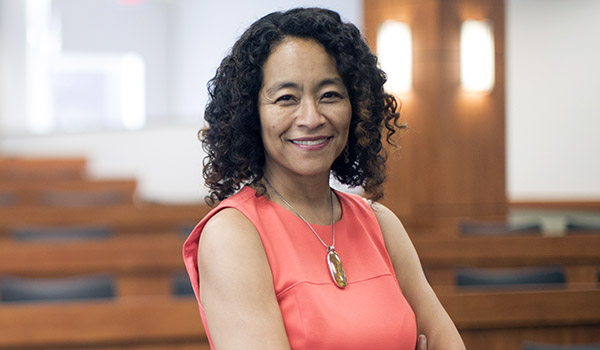
Earlier today, the UC Irvine School of Law — ranked within the top 30 of the nation’s law schools by US News & World Reports, and ranked 10th among public universities — announced that Professor L. Song Richardson has been named the school’s newest dean, succeeding UCI Law’s founding dean, renowned constitutional law scholar Erwin Chemerinsky.
Dean Chemerinsky had served as UCI Law’s dean for nearly ten years since the school’s founding in 2008 before accepting the position of dean at UC Berkeley School of Law this past summer. Richardson had been serving as interim dean since Chemerinsky’s departure, but with today’s announcement now becomes the second dean in the school’s history. Richardson — who is mixed race Black and Asian American — is also the only woman of color to currently serve as dean of any top-30 law school, and she may also be the first Asian American woman to be named dean of a major American law school. (I would welcome reader corrections if I am in error on this latter point.)
Having graduated from Harvard College and Yale Law School, Richardson is a renowned legal scholar in the fields of criminal law and criminal procedure; her work specializes in the intersection of crime with psychology and implicit racial and gender bias. Richardson joined the faculty at UCI Law in 2014.
Speaking to Orange Coast Magazine earlier this year, Richardson reflected on how her family’s experiences with race informs her scholarship:
On family road trips in the early 1970s, L. Song Richardson’s parents took along an empty coffee can to use instead of having to stop at restrooms. It wasn’t until she was in college sharing childhood memories with friends that she realized how unusual this was and thought to talk about it with her father, an African-American and a lieutenant colonel in the Army, and her mother, a Korean immigrant.
She learned that her parents had been reluctant to pull into gas stations and other places where they didn’t know how they’d be treated. It was one of the many ways they attempted to shelter their children from the challenges they faced as an interracial couple.
Flash-forward to the present, and Richardson is still asking questions about race and society. A graduate of Harvard University and Yale Law School and a faculty member at the UC Irvine School of Law since 2014, she is one of the nation’s leading experts on the complex and politically charged issue of racial bias and the criminal justice system.
Asian Americans are the fastest-growing law student population in the country, yet our community remains woefully underrepresented among the law’s top positions. Few Asian Americans are appointed as judges, promoted to law firm partnerships, or hired as law school faculty, suggesting that Asian Americans continue to face a “bamboo ceiling” in the legal profession that stymies career advancement. Even fewer Asian Americans are named to the deanship of a law school. In 1991, Professor Wallace Loh became the first Asian American to be serve as dean of major law school when he accepted the deanship of University of Washington law school. Since then, not many Asian Americans have been able to follow in Loh’s footsteps.
Women are also vastly underrepresented in legal academia: women make up only 30% of tenured law school faculty, and only 20% of law school deans. Law, like medicine and programming, is a traditionally male-dominated field that is only now opening its doors to people who do not identify as White men.
It should therefore come as no surprise that Asian American women and other women of color face a “double-bind” that bars their advancement in legal academia. In 1996, Pat K. Chew reflected in a piece for the Asian American Law Journal that “a current composite picture of an Asian American law professor based on characteristics frequently found in the group as a whole” would likely describe a Chinese American man who specializes in business or international law. By contrast, Asian American women are disproportionately underrepresented among law school faculty, even when compared to Asian American men. Indeed, only this year did the first Asian American woman in the history of Harvard Law School receive tenure.
Chew notes that studies of women of color faculty find that they are often awarded less-prestigious positions compared to their men of color counterparts. Chew quotes one such study by Meritt and Reskin (1992) as finding that:
Differences in the credentials and personal characteristics of minority men and women do not explain the dramatic differences in their statuses on law faculties …. Instead, the evidence suggests that law schools both reward minority men more handsomely than minority women for certain credentials and afford men a bonus for their [gender].
It is in this context that we should find Richardson’s naming as the next UCI School of Law dean particularly noteworthy: with today’s announcement, Richardson becomes the only woman of color to currently hold the deanship of a high-ranking law school — and she is possibly the first Asian American woman to ever serve in that position.
“Song Richardson is the perfect person to take UCI Law into its new era. The greater community will benefit from her expertise and dedication to public service – which is at the very core of UCI Law’s mission – and her inspirational leadership will continue to inspire future generations of attorneys,” said Gary Singer, a UCI Foundation trustee, in a press statement from the school.

